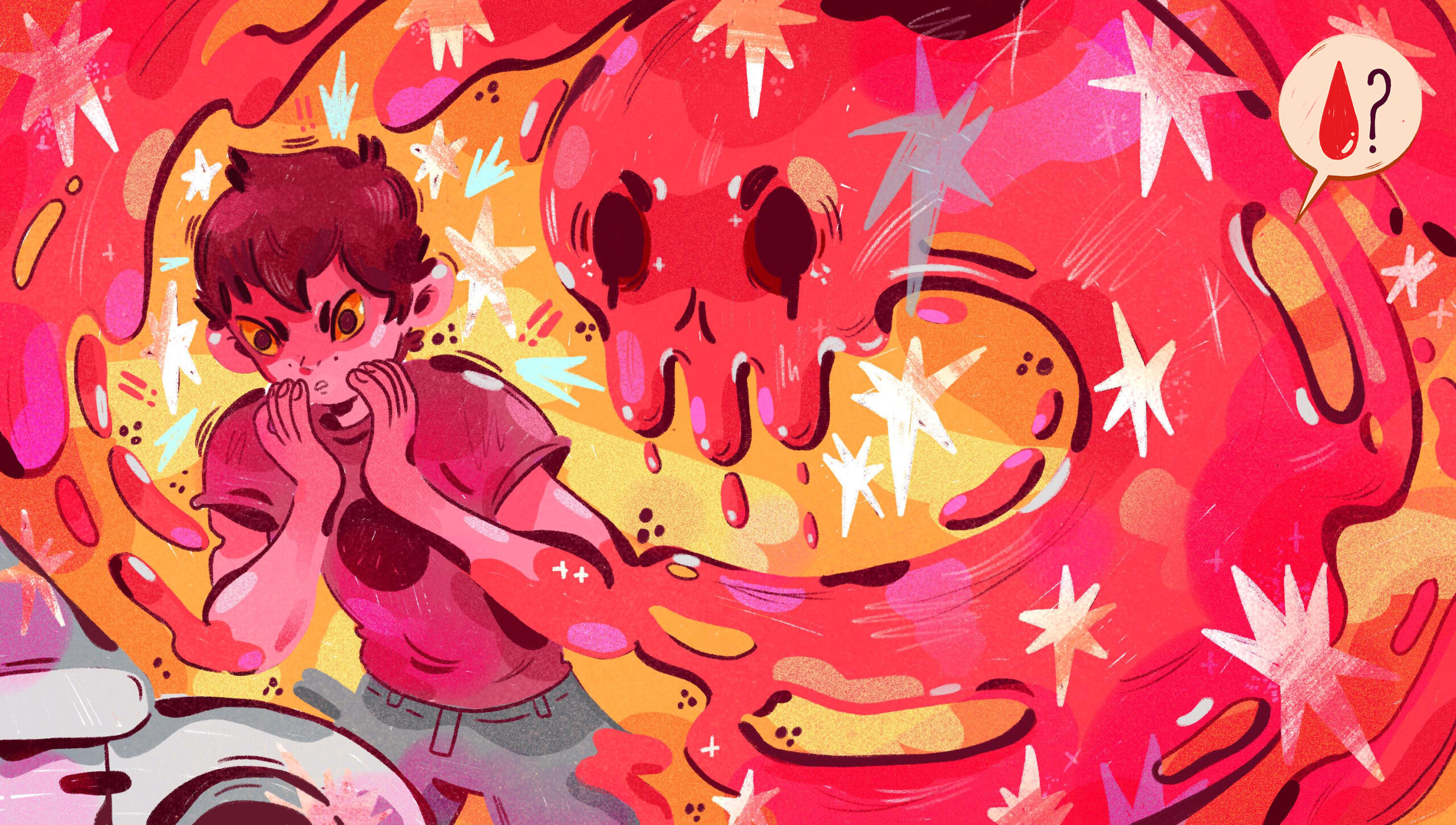This story is part of Seeing Red, a month-long series exploring periods from an LGBTQ2 perspective.
When I was 19, I saw the scariest movie I’d ever seen in my life: William Castle’s 1961 horror-thriller film Homicidal. It wasn’t very good — a B-list take on Psycho that wasn’t gory — but it was about being trans.
Homicidal followed a man who, in the parlance of the time, wanted so badly to keep his gender-affirming surgery a secret that all he could do was kill. The film didn’t destroy me because I was scared of dying. It destroyed me because I identified so much with the killer, someone who took revenge on the cisgendered order of things, who killed with such passion and fervor, who seemed to deal with the social suppression of her femininity by shedding as much blood, over the course of 90 minutes, as she possibly could. The murders complete, the wig comes off and the knives get neatly tucked back in the kitchen drawer.
Six years earlier, I was sitting on the toilet at my friend’s house just a few months before getting my first period. I had been dreading the inevitable, and hoped to somehow avoid getting my period altogether — even resorting to prayers and promises to be pure in an effort to escape my biological fate. I knew my period was coming for me, but I thought I could fight it, like Jamie Lee Curtis, the hero of Halloween, taking on the killer that was slowly closing in on her.
“I knew my period was coming for me, but I thought I could fight it — like Jamie Lee Curtis, the hero of Halloween, taking on the killer that was slowly closing in on her.”
While on the toilet, I remember thinking to myself: “There’s still time.” I couldn’t articulate it then, but I was telling myself: “There’s still time for the world to realize you’re a boy. As long as you don’t have your period yet, there’s time to change their minds about you. All those people who think you’re a girl.”
But it was too late, of course. The call was coming from inside the house.
Growing up, I scared easily. Every horror movie that I saw seemed to point a finger directly at me. “See, you’re a monster,” they said. I stayed far away from A Nightmare on Elm Street and Friday the 13th, films about people who didn’t neatly fit into society and thus became killers. I wanted to run as far away as possible from the guilt I had that something was deeply, deeply wrong with me — the feeling that a film like Homicidal, with its trans slasher protagonist, confirmed.
Critic and theorist Carol J Clover, best known for coming up with the final girl theory — so named for the last woman or girl left alive in horror films to confront the killer and tell the story — sees the horror genre as a kind of battlefield upon which our culture’s subliminal ideas about gender fight, quite literally, to the death. “Slasher films present us in startlingly direct terms with a world in which male and female are at desperate odds,” Clover wrote in 1987, “but in which, at the same time, masculinity and femininity are more states of mind than body.”
As adults, we have the ability to deconstruct gender. That freedom comes, of course, with massive amounts of dysphoria triggered by the depressingly gendered and biological world that exists outside our minds. When I get my period, I hear a horrifying maternal voice say, “See, there’s no escaping your womanhood.” I can call myself a person with a period and know what that means, but I can’t count on the rest of the world to accept or understand.
“One of the most enduring lessons that horror movies teach us is that there are some things you can’t outrun.”
One of the most enduring lessons that horror movies teach us is that there are some things you can’t outrun. But these films are also about the things we do, think and say that break the unspoken social or moral code. About the ways in which we are messy and monstrous — and there’s nothing more emblematic in the genre than menstruation. Scholars like Julia Kristeva and Barbara Creed have pointed out that menses is part of the threat of female protagonists: the blood stands in for the biological chaos that lives inside the body. When it begins to flow, unleashed, it’s a reminder that society sees people with periods as dangerous — monstrous.
Brian De Palma’s 1976 adaptation of Stephen King’s Carrie is a prime example of the menstruating female protagonist made monstrous and menacing. Carrie White is a young woman raised by a puritanical mother who believes that all sex is sinful and who neglects to even explain menstruation to her daughter. When Carrie gets her period in the locker room at school, she has no idea what to make of it. She enters maturity in the most traumatic way possible: in public, with her female classmates screaming at her to “plug it up” while she totally breaks down, blood streaming down her legs. Her first period is also the start of her telekinetic powers. As feminist scholar Barbara Creed says in her book The Monstrous-Feminine: Film, Feminism, Psychoanalysis, “By associating Carrie’s supernatural powers with blood, the film draws on superstitious notions of the terrifying powers of menstrual blood.”
Carrie lives in a world where her gender, according to her mother’s single-minded religious beliefs, makes her a monster, stained by original sin and tainted by her emerging sexuality and womanhood. When Carrie takes control of her powers, her revenge centres on one of the most traumatic, gendered activities a young person can be put through: high school prom. One could say that the queerness of the movie is baked-in — what queer kid doesn’t want to torch their school prom? Still, it’s the fact that Carrie was never given a chance to live the life of a typical teenage girl that makes her lose it. When she realizes that her dream night was all part of an elaborate prank, a joke about how bad Carrie is at performing her gender, she rages — ending with her covered, once again, in blood.
That’s not the only portrayal in horror of periods as being monstrous and death-inducing. The 2000 Canadian cult favourite Ginger Snaps follows two outcast sisters, Ginger and Brigitte, as they navigate high school life in the suburbs. On the night of Ginger’s first period, she gets bitten by a werewolf, launching a sexual awakening as she physically changes into the creature — all while menstruating heavily. One of the taglines of the film makes the link crystal clear: “They don’t call it the curse for nothing.” In both Ginger Snaps and Carrie, menstruation makes women a target of their peers who are amused and disgusted by their changing, Othered body. In both, they develop supernatural powers that ultimately lead to their deaths.
For many folks who get periods, menstruation can be devastating, alienating and symbolically feel like the end. Even without the gendered connotations of the act, there’s still a lot to be afraid of. Though a regular period is culturally viewed as a sign of good health, it can feel like a haunting for people who experience chronic pain along with it or for those who don’t plan on procreating (or, instead, who are trying to get pregnant). It also haunts trans folks: what better symbolizes the trauma and terror of coming into a body you don’t identify with than the sight of blood oozing out of it, a secret that can’t be kept inside any longer?
Like most trans kids, instead of using my adolescence as a time to discover who I was, I was busy trying to suppress what was already there. But trying not to be trans when you’re trans is stunting the growth of a living thing. You’re trying to make the truth not be true, and in turn, stop your body from doing what bodies do rather than focus on what puberty means for yourself. This mind-body split is a crucial part of growing up trans.
That split, that horrible conflict between body and brain, is what so many horror films tackle so well, especially when it comes to puberty issues. Growing up with a body that menstruates means that you’re likely to get a lot of conflicting information: it’s a miracle. It’s a right of passage. You’re a woman now. You’re stained. You’re sinful. You’re unclean. You’re a whore.
When you’re trans, the compounded pain and confusion of these messages combine with a sense of your period as a curse — something specific to you, as a punishment for who you are — to create a kind of terror surrounding the whole enterprise.
It also leaves a lot of room for empathy. Once we get past the horror of having a body — and all its functions — we can start to understand the different ways in which every person, cis and trans, is trapped by it. The feeling of being at odds with your gender may not be universal, but the feeling of being betrayed, limited, or defined by your body is part of the human condition.
There are few events in life aside from menstruation that are so definitively about the fact of biology. But in horror movies, it kind of couldn’t matter less. For the female lead, the period stands in for destruction, something that brings her demise.
But for those of us who never wanted to have anything to do with our biology, for those of us who menstruate but don’t fit the profile of the female monstrous protagonist, there’s freedom in this — it gives us the chance to reimagine ourselves outside this trope, to see other possibilities for ourselves. And this can make menstruation — that terrifying, larger-than-life thing that so many of us as trans folks try to ignore, change and run from — totally powerless.

This story is part of Seeing Red, a month-long series exploring periods from an LGBTQ2 perspective.


 Why you can trust Xtra
Why you can trust Xtra


